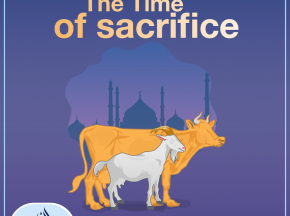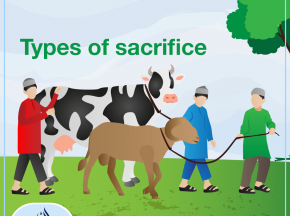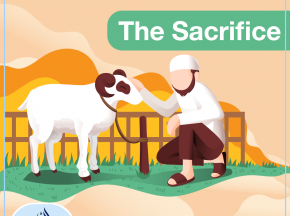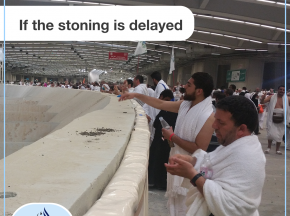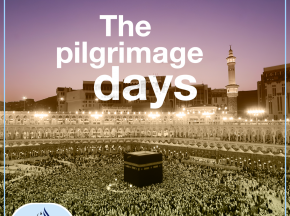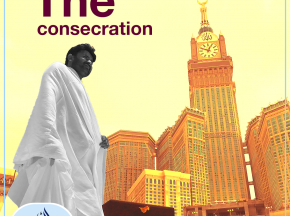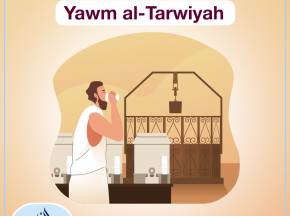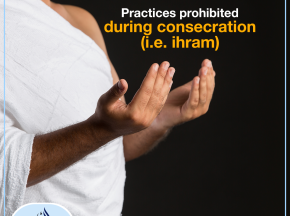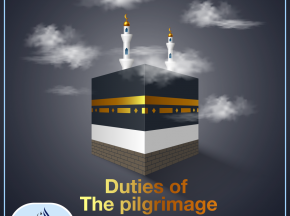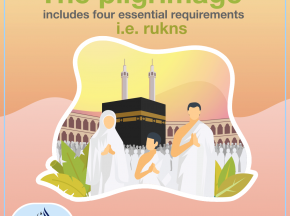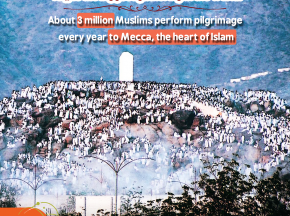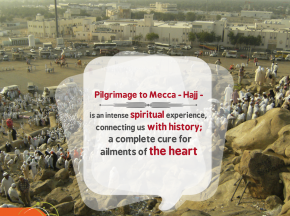content of level
The Time of sacrifice
The Time of sacrifice.
Types of sacrifice
Offering a sacrifice by slaughtering a sheep is obligatory for people offering the pilgrimage in the tamattu' or qiran methods. This is a sacrifice offered in gratitude to Allah for enabling the pilgrim to offer both the pilgrimage and the 'umrah in the same season.
The Sacrifice
Al-hady is an Arabic term that refers to the sacrifice offered as part of the pilgrimage. The sacrifice comprises animals: camels, cows and sheep that are slaughtered to earn Allah’s reward.
On the way back
‘When the Prophet (peace be upon him) started his journey home after an expedition, or after the pilgrimage or 'umrah, whenever he came to a narrow passage or an open space, or a plateau, he would say Allah-u akbar three times then add: La ilaha illa Allah wahdahu la shariqa lah. Lahul-mulk wa lahul-hamd, wa huwa [ala kulli shay’in qadir. Ayibun, ta'ibun, [abidun, sajidun, lirabbina hamidun. Sadaq Allah wa'dah, wa nasar 'abdah, wa hazam al-Ahzaba wahdah’.
If the stoning is delayed
A pilgrim who has delayed the stoning until the last day starts doing this duty as for the first day, i.e. 11 Dhul-Hijjah, and performs the stoning at the three Jamrahs in the right order, as explained earlier. After stoning at the Grand Jamrah, he goes back to the first Jamrah to do the stoning for the second day, 12 Dhul-Hijjah, at the three Jamrahs in the same order. He repeats the whole process again for the last day, 13 Dhul-Hijjah. When he has done this, his pilgrimage duties are completed and he should leave Mina. It should be noted that if stoning is not done before sunset of the 13th, it cannot be done afterwards.
The pilgrimage days
Pilgrimage starts by the pilgrim taking a bath, declaring his intention to do pilgrimage, entering in a state of consecration and starting his journey to Mina by midday. This article explains all steps in details.
The consecration
Pilgrims start their consecration from the place where they happen to be in Makkah or Mina or any other place. They declare: Labbayka Allahumma hajjan (i.e. I respond to You, my Lord, intending to do the pilgrimage). The pilgrims who chose the qiran or ifrad methods are already in consecration.
Yawm al-Tarwiyah
Pilgrims staying in Makkah or resident in Makkah are recommended to take a bath, wear perfume, and then enter into the state of consecration for the pilgrimage during mid-morning.
Types of Pilgrimage
Types of Pilgrimage.
Compensation
Compensation is an obligation on pilgrim if he violates any of pilgrimage restrictions. Compensation is due whether the violation was for a valid on invalid reason. It may be a sacrifice, donation or fasting.
Practices prohibited during consecration (i.e. ihram)
Practices prohibited during consecration (i.e. ihram).
Recommended practices of The pilgrimage
Recommended practices of The pilgrimage.
Duties of The pilgrimage
Duties of The pilgrimage:
The pilgrimage includes four essential requirements, i.e. rukns
The pilgrimage includes four essential requirements, i.e. rukns.
Conditions for Pilgrimage
Conditions for Pilgrimage: 1-Islam 2-Sanity 3-Puberty 4-Freedom.
Pilgrimage
Pilgrimage is one of the five pillars upon which the structure of Islam is built on. Its steps are clearly mentioned in Quran and it must fulfill certain rites in particular places and times in order to be complete.
Pilgrimage to Mecca
Hajj lasts for 5 days and includes a visit to the Ka'ba - a House built by Abraham for the worship of the One, True God.
The Pilgrimage
Hajj is the biggest gathering in the world. About 3 million Muslims perform pilgrimage every year to Mecca, the heart of Islam.
Pilgrimage to Mecca - Hajj
Pilgrimage to Mecca - Hajj - is an intense spiritual experience, connecting us with history; a complete cure for ailments of the heart.
Importance of Hajj
Hajj is one of most important pillars of Islam and it is one of greatest religious duties.

